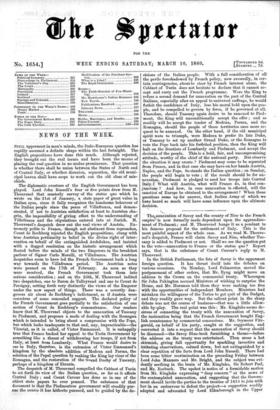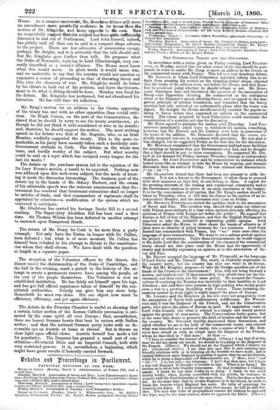The e annexation of Savoy and the county of Nice to the
French enipire'1/4is now formally made dependent upon the aggrandize- ment of Piedmont; and M. Thouvenel hangs it as a pendant to his famous proposal for the settlement of Italy. This is the most painful aspect of the whole case. As we read M. Thouve- nel's despatch, France will claim Savoy and Nice, whether Tus- cany is added to Piedmont or not. Shall we see the question put to the vote—annexation to France or the status quo ? Report says, that is the substance of Count Cavour's reply to M. Thouvenel.
In the British Parliament, the fate of Savoy is the uppermost foreign question. It has thrust itself into the debates on various occasions. On Monday, Lord Palmerston moved the postponement of other orders, that Mr. Byng might move an address to the Crown on the commercial treaty. Whereupon Sir John Pakington accused Ministers of wishing to surprise the House, and Mr. Horsman told them they were making too free with the opportunities of independent Members. Ministers had mistaken the willingness of the Tories to get quit of the Budget, and they readily gave way. But the salient point in the sharp debate was not the course of business—that was a little allow- able by-play. The real point was this : Mr. Kinglake seems de- sirous of connecting the treaty with the annexation of Savoy, the insinuation being that the French Government bought Eng- lish countenance by commercial concessions. Mr. Seymour Fitz- gerald, on behalf of his party, caught at the suggestion, and converted it into a request that the annexation of Savoy should be discussed—the Savoy Blue-book furnishing a theme—before the address on the treaty was entertained. Then arose a hot skirmish, giving full opportunity for sparkling invective and irritating observations, calmed down, but not extinguished by a clear repetition of the facts from Lord John Russell. There had been some bitter recrimination on the preceding Friday between Lord John Manners and Mr. Bright, and the subject was evi- dently seething in the brain of Mr. Kinglake, Sir Robert Peel, and Mr. Roebuck. The upshot is notice of a formidable motion from Mr. Kinglake expressing " deep concern " at the news of the contemplated annexation, and suggesting that the Govern- ment should invite the parties to the treaties of 1815 to join with her in an endeavour to defeat the project—a suggestion readily adopted and advocated by Lord Ellenborough in the Upper House. As a counter-movement, Mr. Monckton Milnes %yill move an amendment more guardedly moderate in its terms than the motion of Mr. Kinglake, and more apposite to tie case. New
we respectfully suggest that the subjeet has been snfeiently discussed in and out of Parliament. Lord John Russell, indeed, has pithily said all than can be said in a compact shape adverse to the project. There are few advocates of annexation except, perhaps, Mr. Bright, and it is advisable that the talk should end. But Mr. Kinglake goes further than talk. He proposes what the Duke of Newcastle, replying to Lord Ellenboraugh, very cor- rectly described as a counter alliance. The House must know what this would mean. In plain words it would mean war, and we undertake to say that the country would not sanction so expensive a course of proceeding as that of throwing Savoy and Nice into the chancery of war. Mr. Kinglake would do better by his clients to back out of his position, and leave the,Govern- meat to do what is _fitting should be done. Monday was fixed for the debate. Mr. Kinglake has postponed, but not abandoned his intention. He has still time for reflection.



























